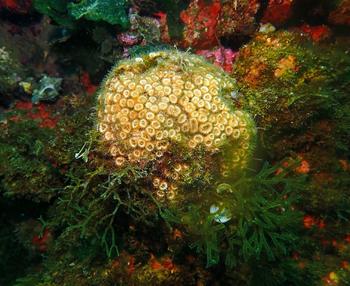Climate Change and Its Impact on Coral Cladocora caespitosa in the Mediterranean Sea: Insights from Coral Skeletons
News vom 05.12.2024
The Mediterranean Sea is experiencing alarming rates of warming, posing significant threats to marine ecosystems, particularly for slow-growing species such as the coral Cladocora caespitosa. This essential habitat-building coral, endemic of the Mediterranean Sea is facing repeated mass mortalities linked to rising water temperatures. In our study, recently published in the Journal of Animal Ecology, we used X-rays to analyse the growth bands of C. caespitosa across three sites in the North-western Mediterranean Sea, reconstructing up to 23 years of the life-history of corals, as well as the sublethal impacts of climate change related warming.
The North-western Mediterranean populations of C. caespitosa, particularly those of the Columbretes Islands, have been monitored since at least 20 years, with several studies reporting mass mortality events of this coral, related to summer marine heatwaves. But knowledge related to the effects of these events on coral growth still remains partial. However, this information is key in order to understand how the growth trends of these coral populations will respond to future warming scenarios.
Our research revealed regional complexities in coral growth dynamics. While overall growth rates did not indicate an overall significant decline, specific locations did exhibit distressing trends. For instance, in the Columbretes Islands—an area already suffering from warming-related mortality—we observed a decline in coral growth. Notably, we detected stress scars in the coral skeletons, indicative of the impacts marine heatwaves which are permanently registered by the corals. But such indications of stress were not observed uniformly across the locations of the study; corals in Cap de Creus (Catalonia, NE Spain) displayed consistent signs of stress over the last decade, contrasting sharply with those growing in Montgrí (Catalonia, NE Spain) just 20 km to the south, and where the indicators of stress remained surprisingly low. It is possible that this disparity may be attributed to the proximity of the Mouth of the Ter River – one of the major rivers of Catalonia – which provides a crucial food supply for the corals of this location, possibly helping them through evermore frequent marine heatwaves.
For more details on the sublethal impacts of climate change on this coral, and the implications for its resilience: “Reconstruction of Long-term Sublethal Effects of Warming of a Temperate Coral in a Climate Change Hotspot.”
https://besjournals.onlinelibrary.wiley.com/doi/10.1111/1365-2656.14225
Contact
Marina J. Vergotti, Freie Universität Berlin
Telefon +49 30 838 60905
E-Mail m.vergotti@fu-berlin.de
Malteserstrasse 74-100, Haus C, Room C.102
12249 Berlin

